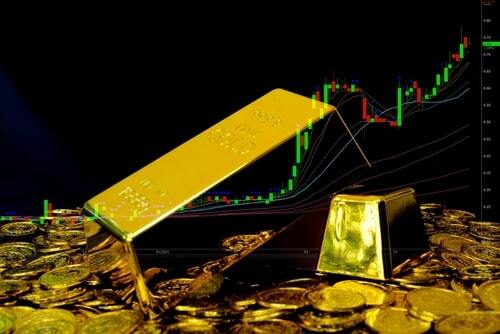
Gold market cautious as investors spooked by risk of Fed hiking 50 bps in March
Gold is down for the fourth week in a row as markets are worried about how aggressive the Federal Reserve will have to be to bring inflation down to 2%.
Markets were hit with stronger-than-expected economic data and stubborn inflation numbers this week.
In response, gold struggled, with April Comex gold futures down 1.3% on the week and last at $1,851 an ounce.
"Inflation will be more sticky than many anticipated. And we got confirmation that economic data is firm," TD Securities global head of commodity strategy Bart Melek told Kitco News. "The next Fed move could be 50 basis points. And the central bank might not be able to stop there. And that means higher rates for longer."
The problem for gold is that the U.S. dollar has been climbing. "The hypothesis that the U.S. dollar will weaken in a big hurry is being questioned," Melek said.
For those playing the long game, OANDA senior market analyst Edward Moya told Kitco News that there are two drivers to keep an eye on.
The first is the new expectations for additional Fed tightening. "The Fed is clearly going to remain aggressive in tightening. The 50 bps startled a lot of traders," Moya said. "Even though half a point rate increase might not play out, the Fed will be hiking in March, May, and probably in June."
The CME FedWatch Tool currently sees an 18% chance of a 50 bps hike in March.
The second thing to watch is recession risks, which will start climbing as the Fed continues to raise rates. "It seems we are recession bound. This is an economy that will need a recession to bring down inflation. And markets will start to believe that," Moya noted.
And all the recession talk is good for gold, he added.
Gold price levels to watch
Analysts remain largely neutral on gold in the short-term as they see the $1,800 an ounce level as likely holding. "I don't think $1,800 will break. That is a huge support level," Moya said.
Next week, analysts will look at FOMC minutes from the February meeting, PMI data, the Fed's preferred inflation measure – core PCE, and more Fed speakers.
Longer-term, Melek is optimistic that the precious metal could still hit $2,000 an ounce towards the end of the year or in early 2024.
"The market will react to the actual pivot happening. The question is whether it will be later in 2023 or early 2024," Melek said. "As the economy slows, the Fed will decide that slower economic activity will do more harm than bringing inflation down to 2%."
Data next week
Tuesday: U.S. existing home sales, manufacturing PMI
Wednesday: FOMC February meeting minutes, FOMC member Williams speaks
Thursday: U.S. GDP Q4, U.S. jobless claims
Friday: U.S. PCE price index, U.S. new home sales
By Anna Golubova
For Kitco News
David